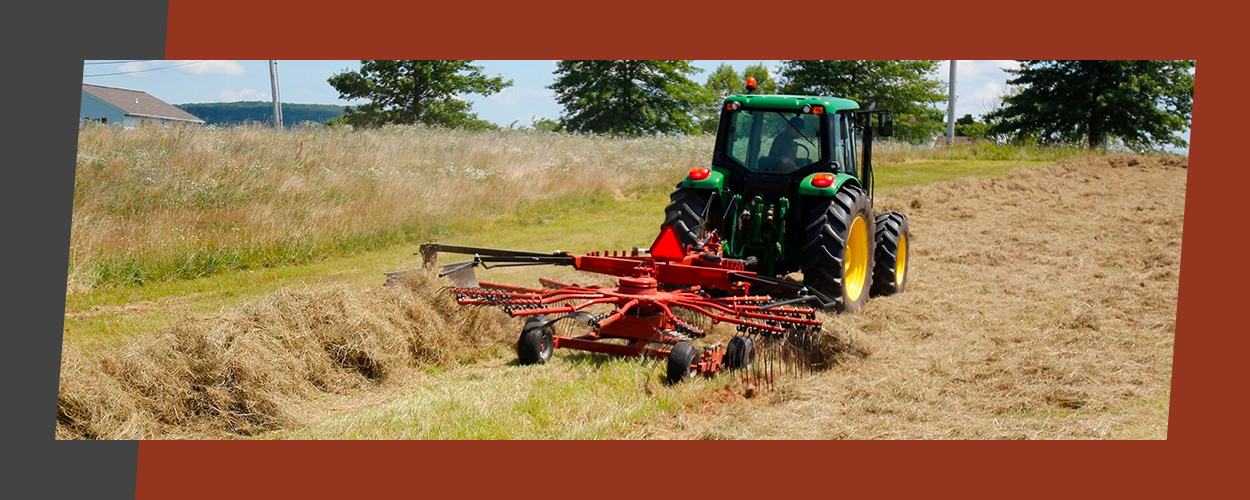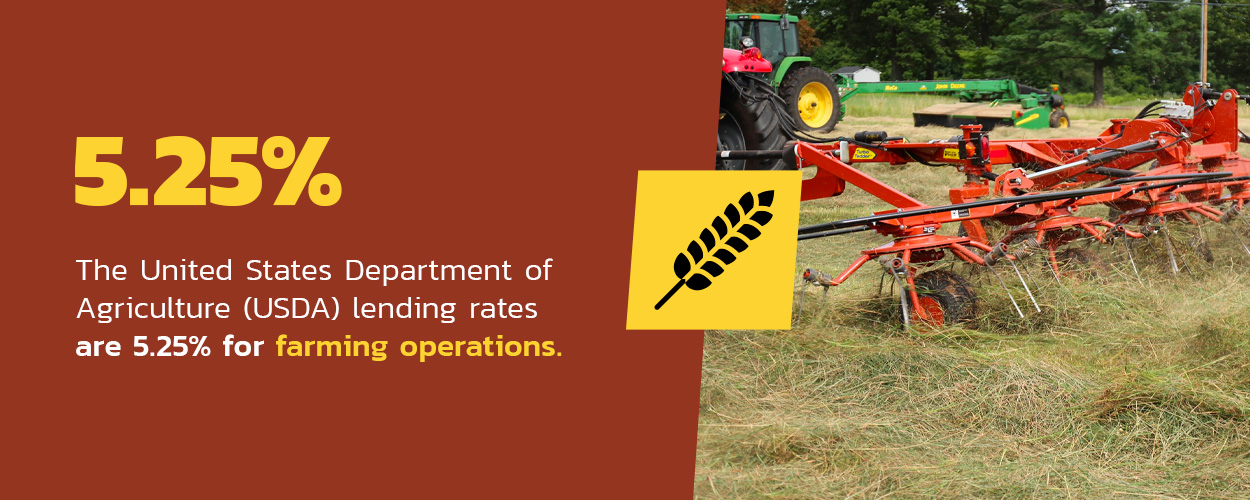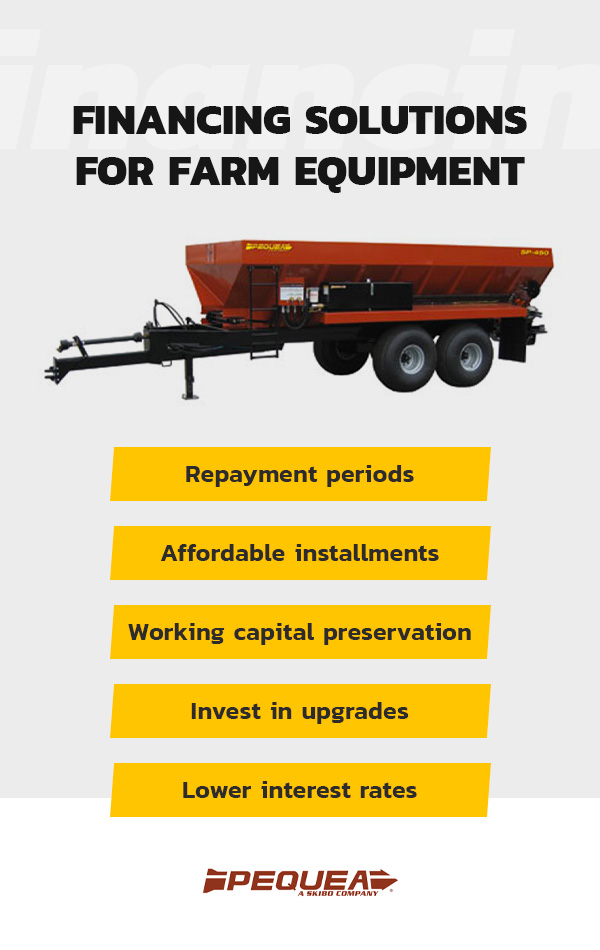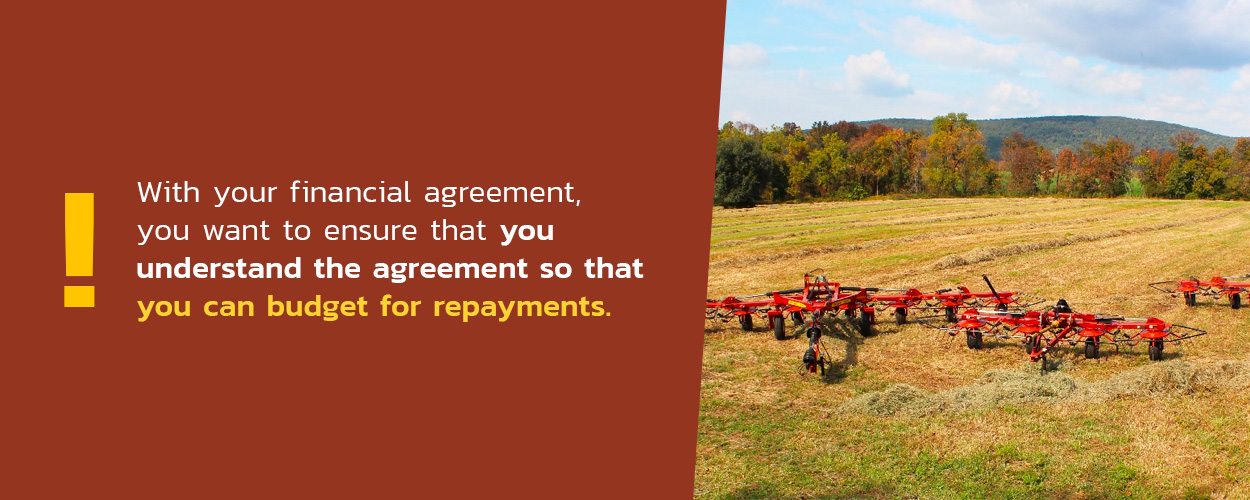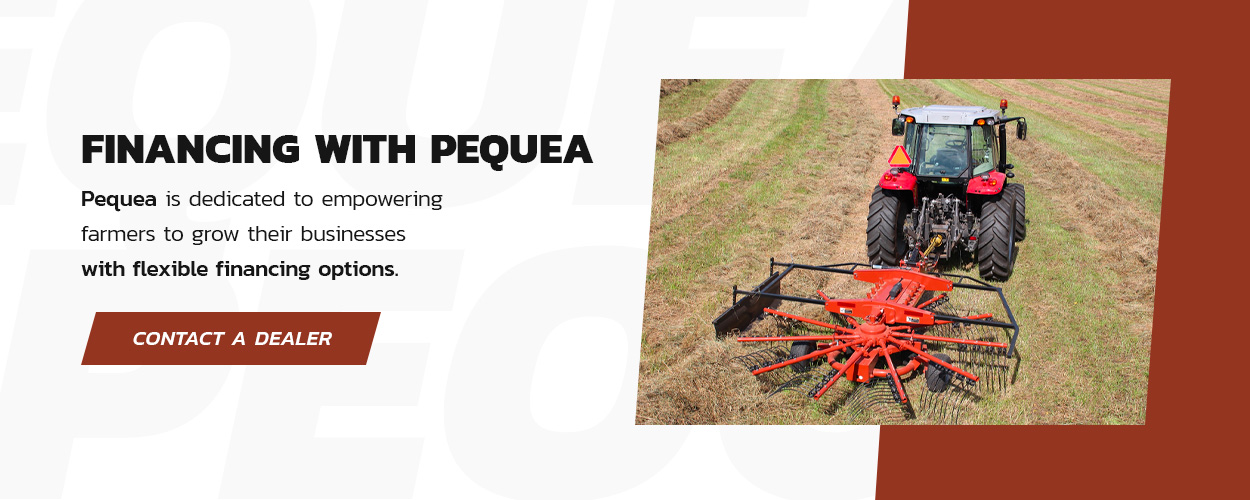How Financing Can Help with Farm Equipment Purchases
Investing in high-quality farm equipment is a commitment to long-term growth and viability. Up-to-date machinery enables you to adapt to changing conditions and stay on par with technological advancements in the agricultural sector. One challenge farmers are facing with modern agricultural operations is the evolving technological landscape. Updated machinery often comes with a hefty price tag, which is a challenge when you must pay those substantial upfront costs.
Financing is a viable solution that allows you to upgrade your equipment without impacting your cash flow. This is why selecting a financing option that prioritizes farmer's growth is crucial. When you fully understand the cost of your family equipment and leverage the financing options available, you can make strategic investments. This action will help your farm maintain a competitive edge as its efficiency becomes optimized thanks to new technology.
Understanding the Cost of Farm Equipment
Farm equipment purchases are substantial investments. The cost of agricultural equipment impacts your immediate financial outlay and the long-term implications for your agricultural operations. It is important to fully understand the upfront purchase price and ongoing maintenance expenses and how these impact your farm's efficiency and productivity.
Investing in high-quality farm machinery is pivotal to ensuring your agricultural professional success. Farming equipment is the backbone of efficiency, streamlining tasks, cutting back on time and allowing you to focus on more immediate aspects of your farm. Reliable machinery also reduces downtime due to breakdowns. This will let you stay on track, capitalizing on optimal planting and harvesting seasons. Additionally, newer machinery may have more safety features to create a more secure working environment for everyone.
The Current Interest Rate Climate
Interest rates directly affect how much you end up paying for farming equipment over time when you use financing. The fluctuation of these rates impacts the accessibility and financial feasibility of your purchases. Higher rates can impact your bottom line and may reduce investment opportunities in more efficient, modern machinery.
The Federal Reserve raises interest rates to 5.5%, increasing a few times since the start of 2022. The net farm income is now expected to decrease by 20%, which creates a challenge for agricultural professionals. The United States Department of Agriculture (USDA) lending rates are 5.25% for farming operations.
However, predictions of the increase in oil prices and the United States Gross Domestic Product (GDP) are sending a positive message of potential relief from a long-lasting recession. It is important to weigh the benefits of investing in new machinery against likely interest rates. Which will give you a better return on investment in the long run?
Benefits of Financing Farm Equipment
You can always lease your agricultural equipment but remember you will not own it. Additionally, you may end up paying more on the lease than the machine's worth. Investing in farm equipment, regardless of interest rate challenges, is a venture that helps your farm produce higher yields, operate better and stay competitive.
Investing in new, more reliable equipment also means you may gain some cost savings alongside long-term value. Whatever the current interest rate climate looks like, there are five guaranteed benefits to financing your farming equipment:
- Access to new technology: Financing allows you to stay up-to-date with technological advancements in farming equipment. The new machinery can help improve operations, yield and quality.
- Better cash flow and preservation: The liquidity of financing equipment allows you to direct cash flow to other aspects of the farm. These can include your inventory, expansion and unforeseen circumstances like a low crop yield.
- Tax benefit opportunities: Your loan's cost may be tax-deductible. This depends on factors like your location or type of arrangement, so speak with your tax advisor to better grasp these tax incentives. There may even be an opportunity to qualify for grant programs that provide additional funding.
- Easier budgeting: Business owners often welcome predictability and stability. When you finance equipment, significant capital expenditure becomes expected, recurring payments. Budgeting becomes more simplified and you can allocate resources across your agricultural business more effectively.
Financing Solutions for Farm Equipment
Equipment loans are a vital aspect of farm operations. When upfront payments are not an option, financing is the answer. These short-term loans use the equipment financed as collateral. These loans are appealing because repayments are fixed, so like with a mortgage, there is no surprise bill at the end of the month:
- Repayment periods: With an extended timeline to repay the loan, you can spread the high cost of farm equipment over several years. This eases the financial stress of buying the machinery outright.
- Affordable installments: When you partner with the right loan provider, you can structure your repayments in affordable installments. This can also give you tailored rates to ensure payments can be made during seasonal periods when your farm has a lower income.
- Working capital preservation: You can use some of your working capital to invest strategically in some tools to simplify farming processes.
- Invest in upgrades: Farm loans allow you to invest in upgraded equipment rather than replacing it with a like-kind or just servicing machines. As the repayment terms spread financing around, you may be able to invest in equipment with the latest technology.
- Lower interest rates: These loans often come with competitive interest rates, which can help to reduce overall costs, upping your return on the investment.
Leasing equipment may be a good option for you if your farm operations only need the equipment for a season or plan to upgrade regularly. This offers protection against depreciation, but leasing options have no tax incentives. You also will not be able to build any equity in the equipment. Both leases and loans offer quick approval and funding, a handy factor if you need to replace equipment quickly.
Spreading Out Equipment Costs
Financing solutions are a game-changing opportunity for farmers to spread out the costs of acquiring machinery. This makes the process more manageable while alleviating financial strain. Financing breaks high equipment costs into affordable installments, which lets you maintain a stable cash flow.
Spreading out equipment costs to help maintain cash flow is a vital strategy in supporting the business side of your farm. Cash flow allows you to keep up with day-to-day activities like carrying livestock or purchasing seeds without incurring extra costs.
Choosing the Right Farm Loan
Before applying for a farm equipment loan, ensure this is the right move for your agricultural business. You want to ensure that the business case justifies the loan's interest. Once you know what your needs and financial capabilities are, review loans while considering:
- Interest rates: Low rates help save money over the long term but confirm whether your loan is fixed or variable. Fluctuations can take away from the predictability of farm equipment loans and impact your liquidity.
- Additional costs: Loans often include additional fees like prepayment penalties, late payment charges and origination fees. Scrutinize these and any hidden costs that can impact your repayment amount.
- Terms and repayment options: Longer terms offer lower monthly installments. Flexible repayment options, on the other hand, can be helpful during seasonal income fluctuations.
- Collateral and down payment: Ensure you understand what collateral you must put down and if the loan requires any upfront down payment.
Comparing the advantages and drawbacks of a loan gives you valuable insight. You can tell if this loan will meet your immediate needs and how it aligns with your long-term financial well-being. It is best to consult with a financial advisor before taking on additional financial responsibilities to ensure you make wise choices.
Manage Your Financing Agreement
On the farm, you pay close attention to water, weather conditions and soil quality. With your financial agreement, you want to ensure that you understand the agreement so that you can budget for repayments. Additionally, it is a good idea to stay in contact with the lender. If you foresee any difficulties impacting your repayment, communicate this in advance.
You should review your agreement yearly to ensure it meets your business needs. If necessary, see if you can renegotiate or increase your repayment amount. Remember to take advantage of tax benefits associated with your loan. A tax advisor can point out all the government-sponsored opportunities and tax incentives at your disposal.
Frequently Asked Questions
We have put together a list of frequently asked questions (FAQs) to help you better understand the nuances of farming equipment loans. While these FAQs offer general information, your loan application process and requirements may differ. Queries we often encounter include:
- What farm equipment is eligible for a farm loan? From farmland to tractor-trailers, you can get financing for most types of farming equipment. Some popular equipment includes machinery to fertilize the soil, lay seeds and maintain crops.
- Who is eligible for a farm equipment loan? Agriculture loans are available to anyone needing to lease equipment, provided they meet the financer's eligibility requirements.
- What are the requirements for a farm equipment loan? Generally, you need a minimum 600 credit score, a farm with annual revenue of at least $250,00 and your farm needs to be in business for at least a year.
- What are the term lengths? Term lengths are generally short — when you finance with Pequea, they can start at 24 or 72 months.
- Do you need to offer collateral? With most loans, you do need to put down some collateral. The equipment you are buying may suffice or the lender may ask for additional collateral.
- What documents do you need? Generally, you will need to provide a valid driver's license, three months' bank statements, a voided check, an equipment invoice and your farm's financial statements.
- Can you get financing with a low credit score? While having a good credit score is ideal, you may be considered for a loan with a low score.
- How are interest rates determined? Lenders will consider three factors that may determine your rate. The risk of the borrower and the loan, an aggregated risk — where you may find favor as you do more business. Finally, lenders must remain competitive, so they often want to give you that loan.
- How much financing can you get? The loan amount may vary depending on the value of the equipment, the lender's terms, your farm's financial stability and your credit score. You may also be asked for a down payment.
Pequea's Customized Financing Options
We offer easy retail financing for all qualifying Pequea purchases. All of our farm loan types and interest rates are competitive as we are dedicated to supporting your agricultural business growth.
Understanding Pequea's Financing Solutions
We have two equipment financing options available — annual and semi-annual payments. The DLL AG Equipment financing program features low fixed rate options on new AG equipment. These loans offer monthly repayments, starting at a rate of 5.50% over 24 months and ending at 7.99% over 60 months.
The Sheffield Trailer Financing program loan terms start at 7.99% over 24 months and up to 15.99% over 72 months. These loans have a once-off fee of $125. Interest starts immediately, with the first payment due within 35 days of closing. A dealer incentive may be charged back if you repay the loan in full within six months or less.
Applying for Pequea Financing
Take the first step towards your new equipment by filling out an application form. Applying for Pequea financing is simple and convenient. Just print out the credit application form, complete it and take it to your nearest Pequea dealer. All transactions are subject to a credit review, approval and the financing terms of DLL Finance. Follow these steps:
- Explore offers: Explore our financing options, which are all tailored to your needs and repayment capabilities.
- Prepare and submit: Gather your documents, print out the credit application form and fill it out. You submit it to your nearest Pequea dealer.
- Review and approval: Our team will review your application and provide prompt feedback. We provide transparent communication, keeping you appraised every step of the way. This process may take between seven to 10 business days.
- Access to funds: If your application is approved, you quickly get access to the equipment you need. Your repayment starts after 30 days of closing.
Financing With Pequea
Farm equipment leasing and financing is a strategic move to help your agricultural operations grow and become more profitable. When you finance new equipment, you spread costs over time. This way, you can align cash outflows with equipment utilization to make it easier to manage cash flow fluctuations throughout the year. The tax incentives that come with financing can also affect your bottom line positively. This may reduce the overall cost of ownership.
Pequea is dedicated to empowering farmers to grow their businesses with flexible financing options. We offer financing packages with rates as low as 0% on all qualifying purchases. We sell hay rakes, spreaders, tedders, trailers, wood chippers, parts and more. Explore our website to find the farming equipment you need with rates for easy comparison. Alternatively, give us a call at 717-354-4343 for personalized support.
